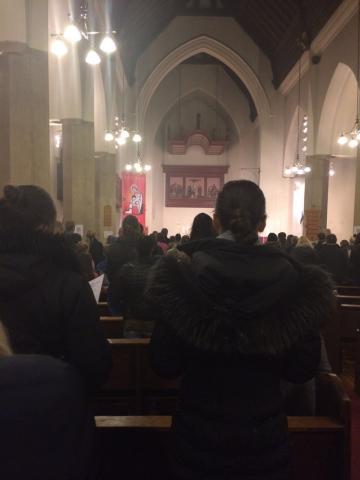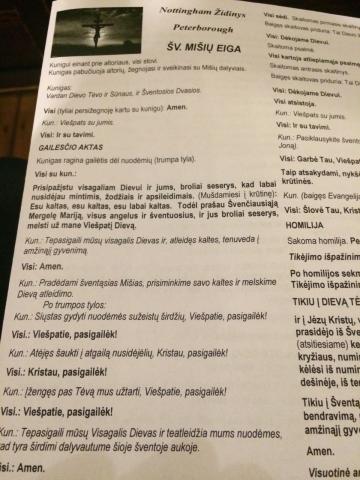
Submitted by A.C. Ludlow on Tue, 08/03/2016 - 17:08
 Through contact with the Lithuanian Priest in Peterborough, we found ourselves at a church service on Saturday 5 March 2016, hoping that some Lithuanian nationals might be willing to speak to us about their motivations for coming to the UK and their experiences. The congregation was visibly nervous about speaking to us and most people darted for the front door of the church rather than speaking to us as we waited at the back door. With some gentle encouragement we did, however, manage to speak with a few people.
Through contact with the Lithuanian Priest in Peterborough, we found ourselves at a church service on Saturday 5 March 2016, hoping that some Lithuanian nationals might be willing to speak to us about their motivations for coming to the UK and their experiences. The congregation was visibly nervous about speaking to us and most people darted for the front door of the church rather than speaking to us as we waited at the back door. With some gentle encouragement we did, however, manage to speak with a few people.
One of the first people to speak to us worked as a trainer for DHL, having previously worked as a trainer in a food factory in Lithuania. She told us that she could earn four times more in this role in the UK than she earned in Lithuania and so moved to the UK for a better life. She had brought with her her two children and talked enthusiastically about how much better schooling is in the UK. She said that she will not move back to Lithuania until the children have finished their education, but she may move to Spain next.
 Next we spoke to a man who is working in the UK as a forklift truck driver.He told us that he was happy in his work and works regular 9-5 hours 5 days a week. He had with him his two children, one of whom was currently in year 4 and the other in year 7. His 11 year old daughter spoke excellent English, at times interpreting what we were saying so that her father could better understand our conversation. The man's younger son explained
Next we spoke to a man who is working in the UK as a forklift truck driver.He told us that he was happy in his work and works regular 9-5 hours 5 days a week. He had with him his two children, one of whom was currently in year 4 and the other in year 7. His 11 year old daughter spoke excellent English, at times interpreting what we were saying so that her father could better understand our conversation. The man's younger son explained
'We are here [in the UK] for better jobs and more money.'
We moved on to talk to a man called Mindaugas. Mindaugas has lived in the UK for 10 years now. He has one daughter and though he began work in the UK as a factory worker, he now works for DHL. He told us that he had been very unhappy in his first job in the UK because he had not been paid holiday pay and was made redundant a few weeks later. Whilst in another job he raised concerns about not getting proper rest breaks (only getting 20 minutes break during a 10 hour working day) and his employer's response was to sack him. Because he was still in his probationary period he had no recourse against his employer but at the time he did not consider bringing a claim or seeking legal advice (e.g. from the CAB) about these issues. Mindaugas told us that he keeps meaning to join a trade union but hasn't got round to filling in the forms yet. He said that his current job is OK but is hard work and managers chastise staff if they stop work at all to speak to other workers.
We asked Mindaugas why other people were so reluctant to talk to us and he said that thye are scared:
'they're scared of not getting work. It's like when the big bosses come round everything is clean and tidy and everyone is happy when really they aren't.'
'What were your hopes for life in the UK?', we asked Mindaugas. 'Better paid work and a better life', he says.
Finally in the church we speak to 2 women, the first of whom has lived in the UK for 5 years and manufactures aeroplane wings and the second of whom has lived in the UK for 14 years and manufactures windows. Both women live in the Fens, near to Peterborough. The first lady, who has lived in the UK for 5 years, explains to us that she came to the UK for a better life, better jobs and because British people are kind, and are not corrupt. The second lady tells us that she had a very hard time working in the UK. Both women are reluctant to talk to us in any more detail and hurry away.
We turn the corner and visit a Lithuanian shop as we head for home. We are served by Velma, a lady who arrived from Lithuania 4 months ago and found work the day after she flew in. She now works at the shop 26 hours a week. Her friend helped her to obtain a national insurance number and gave her somewhere to stay.
'I want more work', Velma says, 'I'm not interested in benefits.'
